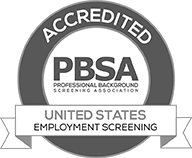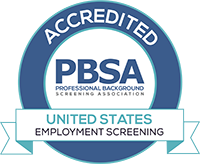BLOG
Are You Following Second Chance Laws?
August 6, 2019
Multiple states are cracking down on employers who violate Ban the Box and related laws.
About Second Chance Laws
Millions of Americans have criminal records. While some are serious enough to make a person ineligible for many jobs, most convictions are minor. They are not cause to deny employment. However, until recently, people who had any type of criminal record often experienced great difficulty while attempting to re-enter the workforce.
Second Chance Laws are created to help people with minor or outdated criminal records. Most prohibit employers from asking questions about arrests and convictions on job applications. People who are required to indicate they have a record at the beginning of a hiring process are unlikely to receive consideration, regardless of whether the conviction has any relevancy to the position.
Every employer is still encouraged to run comprehensive background checks when hiring or making related business decisions. These reports show if a candidate has the necessary employment history, education and any mandatory licenses or credentials. They also show if the person has a serious conviction that indicates they may pose a risk to a business, customers or the public.
Numerous states, cities and counties have implemented Ban the Box and other Second Chance laws. Employers are expected to follow them … but what happens if they do not? More locations are cracking down on organizations that violate these laws. New York and Massachusetts provide strong examples of this.
Employers In New York
New York has a law called The Fair Chance Act. It is a Ban the Box style law that prohibits employers from inquiring about an applicant’s criminal history until after a conditional offer is extended. NY employers are required to consider each conviction individually to assess whether or not it makes the applicant ineligible for hire.
If an employer determines that a job seeker’s criminal history warrants revoking of a conditional offer, they must document why. The Empire State has some of the strictest Second Chance laws on the books. Employers who are found to violate those laws may be subjected to hefty penalties.
In one notable case, a New York employer refused to re-hire a vocational counselor due to a felony from the 1990’s. The former employee sued and was granted $196,624. While this is the largest amount levied against an employer in New York, many others have faced similar situations and been fined for violating state law.
Employers In Massachusetts
Massachusetts implemented a Ban the Box bill known as An Act Relative to Criminal Justice Reform in 2010. It creates limits regarding when employers may ask about criminal records and what type of records they may consider. In 2019, the state government is actively pursuing organizations that are found to violate this law.
The state’s Attorney General (AG) is said to have sent warning letters to various companies about potential violations. At least two employers have been required to pay $5,000 in fines for failure to adhere to Massachusetts’ Second Chance laws. The AG commented on these efforts: “Too many people who have paid their debt to society still face barriers to even landing an interview. These actions are an effort to give all job applicants a fair chance.”
Prepare For Compliance
Are Second Chance Laws active where you operate? If so, do you have policies in place to ensure compliance? Every employer should have written hiring and background screening policies. When applicable, they should include Second Chance laws. National employers may have various laws to contend with based on the locations where they operate.
Best practice is to prepare for compliance by removing questions about criminal histories from all job applications and to consider relevant factors about convictions found in background checks. This includes how long ago an offense occurred, if it impacts the person’s ability to handle a position and whether or not the individual poses a threat to the company or public. While not every criminal record is enough to warrant denial of employment, employers must perform due diligence and avoid hiring individuals who are a known risk.
If you’re ready to run background checks that help you make informed decisions and create a safe workplace, please contact us. Our experienced team makes efforts to keep up with relevant laws throughout the country and can help you build background screening packages that are ideal for any position. We are available to assist you Monday through Friday from 5am to 6pm PT.
#SecondChances #BanTheBox #Compliance #CriminalRecords #BackgroundChecks







